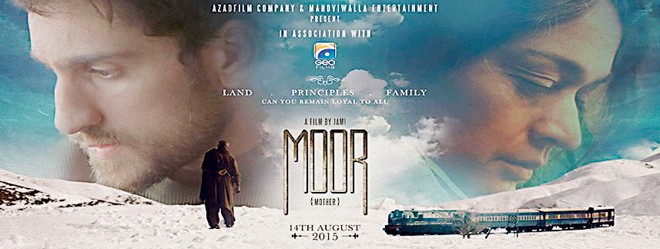
Jami’s passion project has power and patriotic fervour; it’s just not perfect

The stark, haunted, beautiful, dream like images of Balochistan in Moor have a raw power not seen often in Pakistani films (if at all). They deliver what writer/director Jami wants them to do - evoke both an appreciation and awe of nature’s beauty as well a sense of loss – a loss of history, of pride, of honour, of cultural and ethical values. In the abandoned and looted railway stations of Pakistan’s largest province (area wise) lies an apt metaphor for the despoiled state of the country’s resources, its heritage, and, indeed, its spirit (which, somehow, still refuses to die). The poignant (and brilliant) soundtrack by Strings (and featuring the likes of Jawad Bashir, Meesha Shafi, and Rahim Shah) perfectly complements this mood of the film.
But, Jami’s passion project (the movie has taken almost 8 years to script, film, and edit), doesn’t quite hold together. Despite its length (it runs two and a half hours) one feels that that there are whole chunks of story which are missing. For instance, I’m convinced that there was a lot more to the Arzoo (Ishita) storyline and her relationship with Ehsaan (Shaz Khan), the son of the remote Baloch town station-master Wahid (Hameed Sheikh) out to make it in the big city. Arzoo is one of the corrupting influences that Ehsaan experiences in Karachi as she brings him and his partner an illegal money-making scheme. But exactly when the relationship between the two goes beyond the "professional" is never established. So when Ehsaan is suddenly found in Arzoo’s flat at the bottom of his (fairly predictable) downward spiral, the movie ends up hitting a jarring note.
Even more harmful is the almost complete absence of any scenes between Ehsaan and his mother, Palwasha (Samiya Mumtaz) to give us a sense of their relationship. This is crucial given the movie’s title (mother being "moor" in Pashto) and given that it is the news of Palwasha’s death that kick-starts the movie’s plot, forcing Ehsaan’s return to his village. Yes, I am aware that the "moor" of the film is equally (if not more so) the motherland (the implied correlation being made explicit with some unfortunate choice of dialogue in a climactic scene bordering on the melodramatic - there are some things that are better left unsaid) but we needed to see exactly what Palwasha means to Ehsaan as well as to Wahid (who is experiencing a moral struggle of his own) and why. But Jami doesn’t show us this.
Perhaps it was there in the original script. Word is that director shot almost 6 hours of film and a lot of it ended up on the cutting room floor. In fact, the international version of the film is, reportedly, almost an hour shorter than the version released in Pakistan. However, I actually wouldn’t have minded if the movie added another 30 (or even 60) minutes to its runtime if that meant a more cohesive, in-depth narrative that did not sacrifice its melancholic ambience. More breathing room would also have allowed for a greater number of scenes to be played out more naturally, giving key moments of crisis or revelation even more of an impact. When a big chunk of the dialogue is cryptic (and unnecessarily and unnaturally so) and most scenes are replete with heightened, tortured emotions the script has nowhere to go from there and art threatens to turn into artifice. There’s a lot to be said for capturing scenes where people move, speak, and interact like normal people. A scene between Palwasha and Wahid where the two would just be sitting down quietly over a meal, talking simply and normally about the moral choices in front of them would have added so much more to subsequent scenes when emotions and events escalated. Sadly, no such scene (or any other with some much needed down-time) exists.
Acting-wise the movie belongs to Hameed Sheikh and he is excellent except for the false note he (and the movie) strikes in the above-mentioned climactic scene. Shaz Khan is also generally quite good in his debut. Samiya Mumtaz, however, is largely absent, despite being the titular character and being prominently displayed on the movie’s posters and billboards.
I’m convinced there is a great movie in Jami. Unfortunately, Moor, isn’t quite it. Still, despite its weaknesses, the movie will stay with you. It has something important to say and it certainly makes you feel for this country.